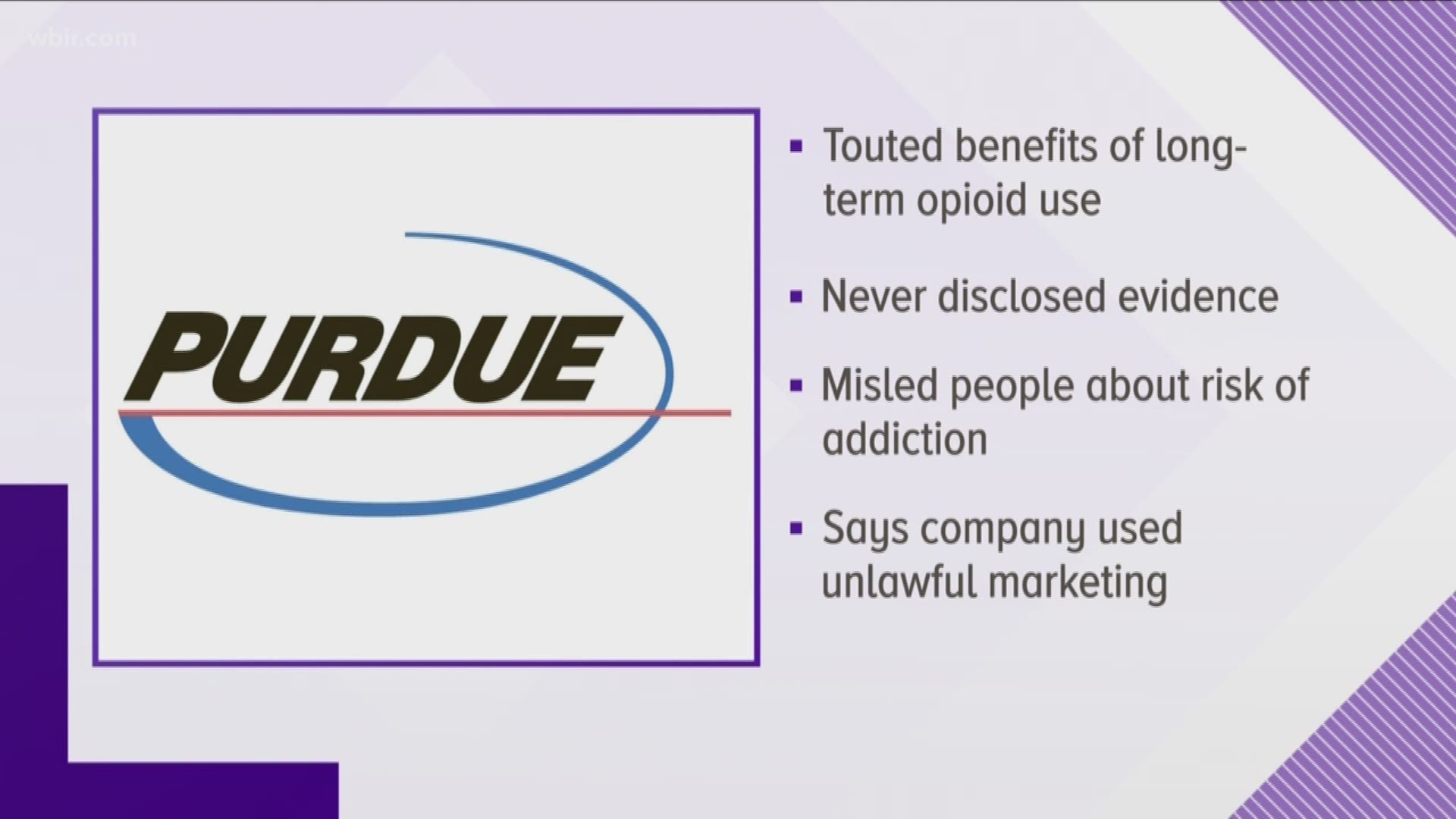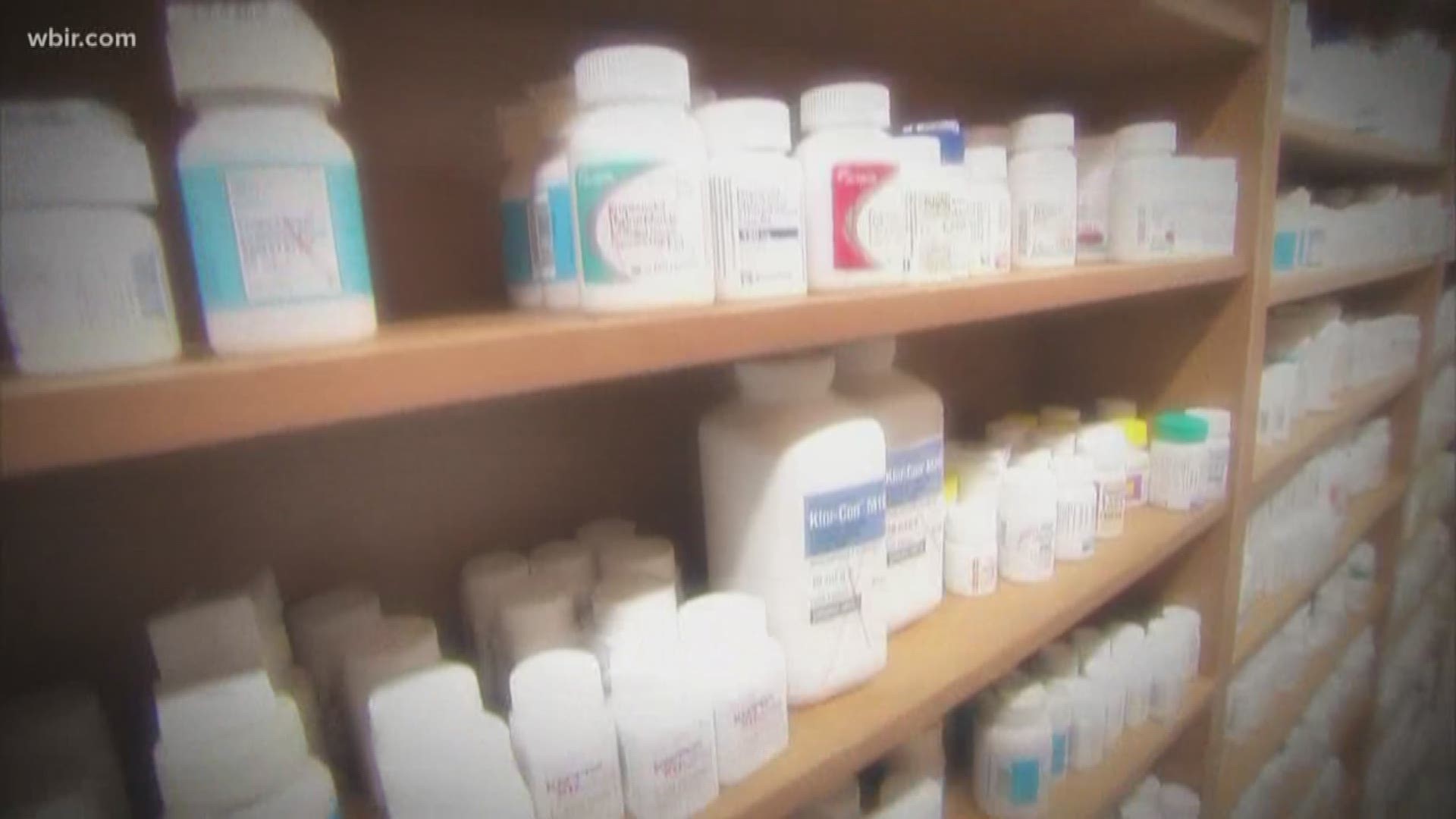The State of Tennessee's lawsuit against Purdue Pharma, maker of the highly profitable and highly popular OxyContin, is now open to the public.
RELATED: WBIR's coverage of the OD Epidemic
The state filed the lawsuit in May, alleging that the drug maker held some blame for aggravating the opioid epidemic in Tennessee. Nearly 300 people died in Knox County last year of suspected drug overdoses, according to the Knox County District Attorney General's Office.
Purdue Pharma first attempted to block out large paragraphs of the lawsuit before it became public by filing a protective order. Tennessee Attorney General Herbert Slatery, however, wanted the 272-page complaint to be open for anyone to read.
Now it is, according to Slatery.
“We are pleased Purdue Pharma decided to withdraw its motion for a protective order, and the State’s complaint is now available to the public on our website or from the Knox County Clerk’s Office. As outlined in our response to the motion, we believe the public has the right to know what is going on in this important lawsuit. We will now concentrate on moving the litigation forward,” General Slatery said in a press release on Thursday.
Documents show the office has been carefully scrutinizing Purdue since at least September 2014. Purdue is a privately held company.
The lawsuit claims that opioids were once rarely prescribed because of safety and addiction fears, but that, but that Purdue created a marketing campaign to change that.
Purdue issued the following statement Thursday evening:
“We share the Attorney General’s concern about the opioid crisis. We are disappointed, however, that in the midst of good faith negotiations with many states, Tennessee has decided to pursue a costly and protracted litigation process. While our opioid medicines account for less than 2% of total prescriptions, we will continue to work collaboratively with the states toward bringing meaningful solutions to address this public health challenge.
We vigorously deny the state’s allegations. The Attorney General claims Purdue acted improperly by communicating with prescribers about scientific and medical information that FDA has expressly considered and continues to approve. We believe it is inappropriate for the state to substitute its judgment for the judgment of the regulatory, scientific and medical experts at FDA.”
Along with the statement a Purdue Pharma spokesperson sent to 10News, was some background information. The company said it "ended sales representative promotion of opioids to prescribers in February.
"Two weeks ago, Purdue ended its sales force engagement with prescribers for all of its medicines. As has been the case for four months, any questions and requests for information about our opioid products will be handled responsively through direct communication with our Medical Affairs department," said Purdue's Executive Director of Communications, Bob Josephson.
Josephson said promotional speaker programs have also ended, Butrans speaker program concluded in the end of 2016, Hysingla ER speaker program ended in Nov. 2017, and the OxyContin speaker program concluded at the end of 2016.
"Purdue created a false narrative to reverse these attitudes among the public, health care providers, and other stakeholders in order to increase sales of its opioid products and its own market share. Time and again, Purdue put profits over people," the suit claims.
The suit further claims that Purdue targeted vulnerable populations like the elderly and that even when it became clear that the opioid addiction was becoming a serious problem, the company persisted with its sales efforts.
"Purdue continued to make sales calls in spite of credible reports of patient overdoses, indictments, adverse licensure actions, a provider admitting he was addicted to heroin, a knife fight outside a provider's office, muggings over controlled substances outside of a pharmacy linked to a specific provider, a clinic that had no examination tables or equipment, an admission by a provider that he was running a pill mill, a provider changing the name of his practice shortly after he was notified of a state investigation into his practice, a patient being coached in the waiting room about how to fill out intakes forms, armed guards in provider waiting rooms, high numbers of patients who purchased OxyContin in cash, high numbers of out-of-state or out-of-county tags in providers' parking lots, accusations of insurance fraud, choreographed urine screenings and pill counts, standing room only waiting rooms, and additional signs of problematic high volume practices," the suit claims.
Purdue was aware that doctors looked to the company for information about how to prescribing decisions by at least 2014, the suit claims.
It cites several calls between Purdue sales representatives and health care providers that show sales reps relabeled addiction as "pseudoaddiction" which refers to patients with drug-seeking addiction due to pain and not actual addiction.
However, in the lawsuit, patients claimed they weren't warned of the risks of addiction and the suit backed that up with a 2015 survey that said four of 10 people claim they didn't the risks.
The suit claims the company falsely said OxyContin couldn't be abused in certain ways like crushing it up and snorting it. It states Purdue said it developed safeguards to make it more difficult to do that and used that as a selling point but didn't emphasize that you could still overdose by swallowing the pill.
The state alleges that Purdue failed to disclose its lack of evidence for long-term opioid use. It says the company persuaded prescribers and patients that there is a significant upside to long-term opioid use but a 2013 FDA statement the lawsuit cites says there have been no adequate, well-controlled opioid use studies that lasted longer than 12 weeks.
You can read the entire suit here.
Tennessee is among a half-dozen states that sued pharmaceutical companies. Separate litigation also is being considering in Ohio federal court.


